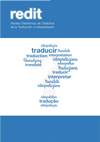Una propuesta didáctica para la formación de intérpretes basada en el pensamiento complejo
DOI:
https://doi.org/10.24310/REDIT.2018.v0i12.3300Resumen
La didáctica de la Interpretación lleva desarrollándose desde hace más de cincuenta años, con preponderancia de los enfoques estructural-funcionalistas. Esto tiene como consecuencia una programación basada en objetivos descontextualizados, la centralización en los aspectos cognitivos y la eliminación del sujeto. En este artículo exponemos los motivos que nos han llevado a diseñar un programa de estudios de Interpretación abordado desde la perspectiva del pensamiento complejo (Morin, 1977 1990) y el constructivismo (Piaget, 1973; Von Glasersfeld, 2011). La conceptualización, planificación, ejecución y evaluación de la propuesta aquí presentada se ha realizado durante siete años consecutivos. Se concibió para alumnos de Grado y Máster de la especialidad de Interpretación de las universidades de Salamanca, Heidelberg y Germersheim. En este artículo se desarrolla la fase de conceptualización en la que se establecen las bases teóricas para las competencias que se deben adquirir, así como las acciones situacionales y los recursos exógenos y endógenos requeridos durante el aprendizaje.Descargas
Métricas
Citas
AIIC. Professional Standards Art. 6. 2017. http://aiic.net/page/6746
AIIC. Collective agreements <http://aiic.net/agreements
Baigorri Jalón, Jesús. 2014. From Paris to Nuremberg: The Birth of Conference Interpreting. Benjamins Translation Library. Vol. 111. Amsterdam; Philadelphia: John Benjamins.
Baigorri Jalón, Jesús. 2004. Interpreters at the United Nations: History. Acta Salmanticensia. 1a ed. Salamanca: Ediciones Universidad de Salamanca.
Barbara Moser-Mercer. 2003. “Cognitive potential and limitations”, en: Simultaneous interpreting. Amsterdam; Philadelphia: John Benjamins.
Damasio, Antonio. 2001. El error de Descartes. La emoción, la razón y el cerebro humano. Traducción de Joandomènec Ros. Crítica: Barcelona.
De la Cruz Recio, Manuel, and Leticia Madrid. 2015. “Si mahoma no va a la montaña...: Un intento de acercar la didáctica de la interpretación consecutiva en expresión oral a la realidad del alumnado”, en Interacciones: Reflexiones en torno a la traducción e interpretación del/al alemán., eds. M. Ángeles Recio Ariza, Belén Santana López, De la Cruz Recio, Manuel and Petra Zimmermann González. Vol. 103, 685-700. Fráncfort del Meno: Peter Lang.
de Saussure, Ferdinand. 1978. Cours de linguistique générale. Payothèque. Paris: Payot.
de Saussure, Ferdinand, Charles Baily, and Albert Sechehaye. 2006. Curso de lingüística general. Akal universitaria. Vol. 1. Tres Cantos Madrid: Akal.
Ehrlich, Karoline. 2011. Stimmbildung und sprecherziehung : Ein lehr- und übungsbuch. 1. Aufl. ed. Wien [u.a.]: Böhlau.
Ekman, Paul, and Richard J. Davidson. 1994. The nature of emotion: Fundamental questions. Series in affective science. New York: Oxford University Press.
Goldberg, Elkhonon. 2001. El cerebro ejecutivo. Traducción de Javier García Sanz. Barcelona: Planeta.
García, Isabel. 2011. Ich rede : Ein hoch auf deutsch.
Daniel Gile. 1995. Basic Concepts and Models for Interpreter and Translator Training. Amsterdam; Philadelphia: John Benjamins.
Gómez García, Pedro. 2003. La antropología compleja de Edgar Morin: Homo complexus. Filosofía y pensamiento. Vol. 3. Granada: Universidad de Granada.
Holland, John H. 2014. Complexity: A very short introduction. Vol. 392. Oxford: Oxford University Press.
Gillies, Andrew. 2013. Conference Interpreting: A Student’s Practice Book. Taylor and Francis.
Máster Universidad de Germersheim. 2017. http://www.fb06.uni-mainz.de/studium/555.php
Máster Universidad de Heidelberg. 2017. http://www.uni-heidelberg.de/studium/interesse/faecher/konferenzdolm.html
Maturana, Humberto Romesín. 1999. Transformación en la convivencia. Santiago: Dolmen Ediciones.
Mitchell, Melanie. 2009. Complexity: A guided tour. New York: Oxford University Press.
Morin, Edgar. 1992. Introduction à la pensée complexe. 4. tirage ed. Paris: ESF éd.
Morin, Edgar. 1990. Science avec conscience. Nouv. éd ed. Paris: Éd. du Seuil.
Morin, Edgar. 1986. La connaissance de la connaissance : Anthropologie de la connaissance. Vol. 3. Paris: Ed. du Seuil.
Morin, Edgar. 1979. Le paradigme perdu: La nature humaine. Paris: Éd. du Seuil.
Morin, Edgar. 1977. L’Méthode I: la nature de la nature. Paris: Éd. du Seuil.
Morin, Edgar, Emilio Roger Ciurana, and Raúl Domingo Motta. 2002. Educar en la era planetaria: El pensamiento complejo como "método" de aprendizaje en el error y la incertidumbre humana. Filosofía / Universidad de Valladolid. Vol. 16. Valladolid: Universidad de Valladolid.
Poyatos, Fernando. 1994. La comunicación no verbal. Biblioteca española de Lingüística y filología. 1a ed. Madrid: Istmo.
Rodero Antón, Emma. 2003. Locución radiofónica. Salamanca: Universidad Pontificia
Shannon, Claude E. & Weaver, Warren. 1949. The Mathematical Theory of Communication. Urbana: The University of Illinois Press.
Thelen, E. & Smith, L. (1994). A dynamic system approach to the development of cognition and action. Cambridge, MA: MIT
Watzlawick, Paul, Janet Beavin Bavelas, and Don D. Jackson. 1987. Teoría de la comunicación humana: Interacciones, patologías y paradojas. Biblioteca de psicología (editorial herder). [Pragmatics of Human Communication]. 6a ed. Vol. 100. Barcelona: Herder.
Descargas
Archivos adicionales
Publicado
Cómo citar
Número
Sección
Licencia

Este obra está bajo una licencia de Creative Commons Reconocimiento-NoComercial-SinObraDerivada 4.0 Internacional.






28.png)
